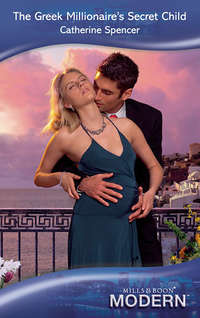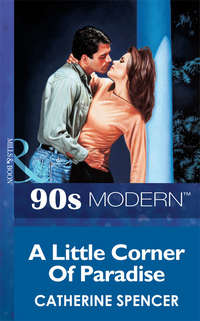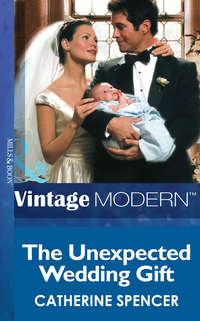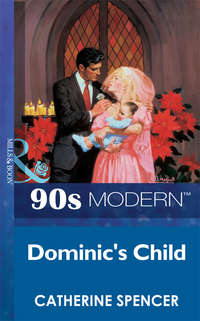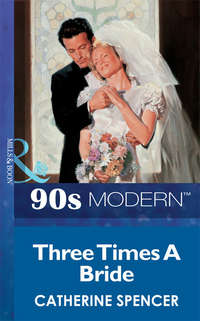
Полная версия
The Millionaire's Marriage

“Where am I…I mean…which room is mine?” Gabriella asked.
She could practically feel Max’s incredulous stare zinging down the phone line! He let a full thirty seconds of silence elapse before replying. “I thought the whole idea here is to convince your parents we’re still happily married, despite what the tabloids say.”
“It is.”
“Then which room do you suppose, Gabriella?”
She muttered, “The master suite?”
“Bingo! Any more questions?”
Indeed yes! But nothing would persuade her to come right out and ask, Will we be sharing the same bed?
She’d find out the answer to that soon enough!
Legally wed,
Great together in bed,
But he’s never said…
“I love you.”
They’re…

The series where marriages are made in haste…and love comes later…
Look out for more Wedlocked! books—
coming soon in Harlequin Presents®!
The Millionaire’s Marriage
Catherine Spencer


Contents
CHAPTER ONE
CHAPTER TWO
CHAPTER THREE
CHAPTER FOUR
CHAPTER FIVE
CHAPTER SIX
CHAPTER SEVEN
CHAPTER EIGHT
CHAPTER NINE
CHAPTER TEN
CHAPTER ELEVEN
CHAPTER ONE
“I’VE left word that you’re expected. If I’m not home when you arrive, the concierge will let you in.”
The words themselves were chillingly neutral but, even after all this time and despite everything, Max’s husky baritone still had the power to make her break out in goose bumps. Holding the phone away from her mouth so that he couldn’t hear how ragged her breathing had become, Gabriella fought the urge to beg him to be there himself to greet her and, matching his tone the best way she knew how, said, “Is it still Howard?”
“I’m surprised you remember, given the number of doormen who must have crossed your path in the last two years.”
He made it sound as if she earned a living paying illicit visits to married men’s hotel rooms! “There are few things about my life with you that I’ve forgotten, Max,” she said stiffly. “Howard was one of the more pleasant aspects. It will be nice to see him again and know there’s at least one friendly face in the building—unless, of course, you’ve poisoned his mind against me.”
“Hardly,” her estranged husband replied. “Your name rarely comes up in conversation, and then only in passing.”
Though there was little doubt he was being his usual brutally direct self, even more regrettable was the fact that the truth should hurt so much. “Are you quite sure we can pull this off?” she said. “Two weeks of facing each other across the table at mealtimes might not be a long time in the cosmic scheme of things, but I suspect it’ll seem an eternity when it comes to living them second by second.”
“I can manage it, if you can. And I have no doubt that you can. It will be, after all, a lot like your life—a charade. And let’s face it, Gabriella, you’ve always shown a talent for pretending. No doubt that explains your phenomenal latter-day success as a model. How else do all those glossy fashion magazines feature you as dewy virgin bride one day, sultry seductress the next, and beach bunny yet another?”
She’d made up her mind she wouldn’t get drawn into the retaliation game, no matter how he might try to provoke her, but his scornful dismissal of the success she’d worked so hard to achieve spurred her to respond, “Why, Max, I had no idea you followed my career so closely!”
“I don’t,” he said crushingly, “but I’d have to be brain dead not to recognize that, technically at least, I’m married to the most famous face in North America and possibly the world. Given your unquestionable versatility when it comes to make-believe, plus the fact that you’re an accomplished liar, I’m sure you can pull off the image of contented wife for a couple of weeks, especially since you have so much at stake and I plan to make myself as scarce as possible most of the time. All it’ll take is a little civility in public, a few harmless demonstrations of affection. We’ve been married over two years, Gabriella. Your parents aren’t going to expect us to act like besotted honeymooners.”
“Which is just as well, since a honeymoon’s one thing I’ve never had the pleasure of experiencing.”
But she knew about heartbreak, and loneliness, and rejection. She knew how it felt to be a bride standing beside a groom who, when he looked at her at all, did so with a blank indifference touched with loathing. She knew what it was like to lie alone in the big marriage bed while her husband slept in the guest room—a pain only slightly less unbearable than the few times when primitive need had driven him to come silently to her in the night then, when his hunger was appeased, just as silently leave her again.
She knew what it was like to be married to a man who hated her all the more because, once in a very rare while, he couldn’t resist her.
“Gabriella? Did you hear what I just said?”
Startled by his unabashed impatience, she jerked her attention back to the present. “Um…not exactly.”
“I asked what time they land in Vancouver.”
They: her aged parents who thought their only surviving child was blissfully happy with the grandson of a man they revered more than God! What if they saw past the subterfuge so carefully constructed for their benefit? What if her world-famous smile cracked, and she couldn’t disguise the misery?
Suddenly, when it was too late to change anything, she wondered why she’d ever encouraged them to leave their native Hungary and visit Canada, or why she thought she could pull off such a monumental deception. “Three o’clock tomorrow.”
“And you’re in Los Angeles now?”
“Yes. I stayed with a friend last night but I’m flying out at ten. I expect to be at the penthouse by early afternoon.”
“That should leave you enough time to unpack and reacquaint yourself with the place. And while I think of it, you might want to pick up a few supplies. The stuff in the refrigerator’s pretty basic and unlikely to measure up to your gourmet standards.”
Why did he do that? she wondered. Why imply that she was impossible to please and needlessly extravagant? Whatever else she’d contributed to the failure of their marriage, overspending his money was not on the list, for all that he’d been convinced his bank account was what had made her chase him to the altar.
But taking issue with him now would lead only to more acrimony and she already had enough to handle. “Grocery shopping’s at the top of my list of things to do,” she said, then waited, hoping he’d volunteer the information she most needed to learn, and so spare her having to be the one to raise a topic he surely hadn’t overlooked.
Once again, though, he disappointed her and with obvious relief said, “I guess that’s it, then. If I don’t see you today, I’ll catch up with you tomorrow at breakfast.”
“Before you go, Max…”
“Now what?” There it was again, the weary impatience she so easily inspired in him.
“Where am I… I mean…um, which room is…mine?”
So clearly taken aback by the question that she could practically feel his incredulous stare zinging down the phone line, he let a full thirty seconds of silence elapse before replying, “I thought the whole idea here is to convince your parents we’re still happily married, despite what the tabloids say.”
“It is.”
“Then which room do you suppose, Gabriella?”
Feeling like a none-too-bright child being asked to put two and two together and come up with four, she muttered, “The master suite?”
“Bingo! And since all my stuff fits easily into one closet, I hope you’re bringing enough clothes to fill the other, unless you want it to be patently obvious that, like your parents, you’re merely visiting. I don’t imagine, given your extensive wardrobe, that’s a problem?”
“None at all,” she said, recovering a trace of the haughty composure that had made her an overnight sensation as a model. “I have three large suitcases packed and waiting.”
“I’m delighted to hear it. Any more questions?”
Indeed yes! But nothing would persuade her to come right out and ask, Will we be sharing the same bed?
She’d find out the answer to that soon enough!
She’d grown up in a palace—a small one, to be sure, and rather shabby around the edges, but a palace nonetheless. The Tokyo apartment she’d bought eighteen months ago, when she left Max, was small but exquisite. Her most recent acquisition, a house with a lovely little walled garden on the outskirts of Rome, was a gem of seventeenth-century elegance.
Still, as she stepped out of the private elevator on the twenty-first floor and stood under the hand-painted dome in the vestibule, the magnificence of Max’s two-story penthouse took her breath away, just as it had the first time she’d set foot on its hand-set marble floor.
Leaving her luggage and the sacks of groceries in the foyer, she crossed the vast living room to the right of the winding staircase and slid back the glass doors to the terrace. Tubs of bougainvillea, hibiscus and tibouchina in full flower lent splashes of exotic color to the sprawling rooftop garden. Yellow roses climbed up the south wall. A miniature clematis with flowers the size of bumblebees rambled along the deep eaves. The raised swimming pool and hot tub shimmered in the drowsy heat of the late June afternoon. People who didn’t know her real reason for taking up residence here again could be forgiven for thinking she’d entered paradise.
Beyond the parapet, the Vancouver skyline showed itself off in all its summer glory. Sunlight bounced off the glass walls of newly built office towers. Sailboats drifted on the calm waters of Georgia Strait. The graceful arc of the Lion’s Gate Bridge rose from the green expanse of Stanley Park to span the First Narrows as far as the North Shore where snow-kissed mountain tips reared up against the deep blue sky.
It had been just such a day that she’d come here as a bride, with the air so hot and still that the tears she couldn’t keep in check had dried on her cheeks almost as fast as they’d fallen. She’d been married all of forty-eight hours, and already knew how deeply her husband resented her. She’d stood in this very spot, long after sunset, and prayed for the hundredth time that she could make him love her. Or, if that was asking too much, that she could stop loving him.
Her prayers had gone unanswered on both counts, and remembering the weeks which had followed left her misty-eyed all over again.
Annoyed to find herself so soon falling back into old, bad habits, she gave herself a mental shake and returned to the cool, high-ceilinged living room. Like the city, it, too, had undergone some change, not by new additions but by the complete removal of anything that might have reminded Max of her.
“Do what you like with it. I don’t care,” he’d flung at her when, as a bride, she’d suggested softening the austerity of the decor with various wedding gifts and dowry items she’d brought with her from Hungary—lovely things like the antique tulip lamp, hunting prints and painted wall clock handed down from her grandparents, and the brass trivets and finely stitched linens from her godmother, all of which she’d left behind when she fled the marriage.
Now, the cherrywood accent pieces Max had chosen before he met her provided the only contrast to the oyster-white couches, carpets, walls and deep, carved moldings. Even the classic fireplace, swept scrupulously clean of ashes, looked incapable of warmth. He had erased every trace of her from his home as thoroughly as he’d erased her from his life and, while some might admire the severe elegance of the room, without the reminders of her childhood home and family, Gabriella found it cold and hostile.
Surely, he hadn’t thrown away those treasures her family had managed to save from the ravages of the political upheaval which had reduced so many once-wealthy families to poverty? Surely, as she went about the business of—how was it he’d put it, when they’d spoken on the phone that morning?—reacquainting herself with her former home, she’d find they’d just been stashed away somewhere?
Returning to the foyer, she averted her gaze from the stairs which led to the bedrooms, and carried the grocery bags to the equally barren-looking kitchen. Max’s claim that he had only basic supplies in stock had been, she shortly discovered, a masterpiece of understatement. Although the temperature-controlled wine cellar at one end of the room was well stocked, the refrigerator contained nothing but beer, a very old block of cheese, and a carton of grapefruit juice.
Apart from a couple of boxes of cereal and some canned soup, the lower cupboards were bare. The glass-fronted upper cabinets stood completely empty, the panes staring back at her like sightless eyes. Neither cup nor plate graced their shelves.
The copper-bottomed pots and pans hanging from a stainless-steel rack above the work island were linked by a fine network of cobwebs, giving testament to how infrequently they’d been taken down. As for the built-in range and double-wall ovens imported from France, Gabriella doubted either had been used since the last time she’d cooked dinner there, over eighteen months ago.
In fact, the entire main floor of the penthouse had the look of a showpiece owned by a man who stopped by only occasionally to check on his investment, and she had no reason to suppose the upstairs rooms would be any different. There was none of the casual clutter, no sense of the warmth that speaks of a home shared by a couple in love. Her father might be fooled into believing otherwise but, as things presently stood, her mother wouldn’t be taken in for a minute.
Realizing she had a host of shopping still to do, she searched through the drawers for a notepad on which to list the items needed. She didn’t find one. Instead, she came across a flowered apron with a ruffle around its hem, and a half-empty tube of hand cream.
The sight caused her stomach to plummet and left her feeling slightly sick. Neither had ever belonged to her and she couldn’t imagine any circumstance which would have persuaded Max to make use of them—in which case, who had?
Don’t do this to yourself, Gabriella, the voice of reason scolded. It’s going to be difficult enough to preserve your parents’ peace of mind by letting them think your marriage is on solid ground so get on with the job at hand, because it’s going to take you the rest of today to make the place look lived in.
By nine that evening, her manicure was ruined but the transformation she’d effected throughout most of the rooms was worth every chip in her nail enamel.
The pantry and refrigerator fairly bulged at the seams with delicacies. In the storage room under the stairs, she found boxes containing the missing heirlooms; also the Herend china she’d brought with her as a bride stowed alongside crates of wedding gift crystal and other reminders of her brief sojourn as lady of the penthouse.
Now, the china and elegant stemware and goblets were again on display in the glass-fronted upper cabinets. A pretty blue bowl filled with oranges, lemons and limes sat on the granite counter beside the brass trivets polished to a blinding shine. A braid of garlic hung next to the freshly washed copper-bottomed cookware, and pots of basil and oregano nestled in a wicker planter on the windowsill.
On a shelf at the very back of the storage room, she discovered the large, silver-framed formal portrait of her and Max on their wedding day. Surprised and grateful that he hadn’t tossed it in the garbage, she’d dusted it off and set it on a side table in the living room, next to two small framed photographs she’d thought to bring with her, of her parents and the brother who’d died six years before she was born.
A fringed shawl she’d found in a bazaar in Indonesia lay draped across the back of one of the couches, its bronze and gold threadwork glowing like fire against the oyster-white upholstery. Flower arrangements blazed with color on the writing desk and sofa table, and filled the empty hearth.
She’d placed slender ivory tapers in the heavy Swarovski candlesticks on the dining room table. The antique sterling coffee service bequeathed to her by her great-aunt Zsuzsanna shone splendidly on the sideboard in whose top drawers lay the freshly ironed hand-worked linens.
Upstairs, the guest room and adjoining bathroom were prepared, with lavender sachets hanging in the closet, a vase of roses on the dresser, soaps and lotions arranged on the marble deck of the soaker tub. Monogrammed towels hung ready for use, the mirrors sparkled. Crisp percale linens covered the bed—that same bed where she’d found Max on their first night as husband and wife in North America.
She’d have thought the enormous emotional toll entailed in facing that room would have inured her to entering the other; the one in which she’d slept—and wept—for nearly six months before she’d found the courage to walk away from her loveless marriage. Yet, with the cool mauve light of dusk pooling around her, she found herself hesitating outside the door of the master suite, a clammy dew of apprehension pebbling her skin.
She was disgusted with herself. In view of everything she’d achieved since her marriage had fallen apart, how foolish of her now to fear four walls! Things could not hurt her. Only people had the power to do that—and even then, only if she let them.
Surely she’d laid those old ghosts to rest? And surely…surely…safeguarding her heart was a lesson she’d learned well since the last time Max had trampled all over it?
Still, she quaked inwardly as she pushed at the heavy door. It swung open in smooth, expensive silence, just as it used to do when, a lifetime ago, he’d paid those brief, late-night visits to her bed.
Inside the room, filmy floor-length curtains billowed in the evening breeze at the tall open windows. Avoiding the hulking mass of the bed itself, her gaze flitted instead from the bench at its foot where one of Max’s ties and a paperback mystery lay, to a pair of his shoes sprawled crookedly next to a chair, and from there to a navy golf shirt and three wooden golf tees tossed carelessly on top of a chest of drawers.
It was a man’s room; a room so devoid of a feminine presence that it might never have accommodated a bride. And yet the ghosts of yesterday sprang out at her from every corner, clamoring to be acknowledged.
Her first night there, she’d bathed in scented water, put on the gauzy peignoir trimmed with French lace that was part of her trousseau, sprayed a little perfume at her wrists and throat, and brushed her pale blond hair to satin smoothness against her shoulders. And waited for Max.
The sky had grown pearly with a new dawn before she’d finally accepted that he was not going to join her. And so, silly creature that she’d been then, she’d gone looking for him. And found him spread-eagled on the bed in the room across the hall, sleeping soundly with a sheet half covering him from the waist down.
For the longest time, she’d simply looked at him, bewitched all over again by his masculine beauty. Such skin, polished to bronze, such perfect symmetry of form, such sleek, honed strength!
Oh, how she’d ached to be enfolded in his arms, to be possessed by him! How she’d longed to feel his mouth on hers, claiming her soul; to hear his voice at her ear, hoarse with passion!
Driven by hunger and need and hope, she’d traced her fingertip along the curve of his eyebrow, smoothed her hand lightly over his dark hair. Made bold by the fact that he didn’t stir, she’d bent down to lay her mouth on his when, suddenly, his eyes had shot open.
Instantly awake, suspicious, annoyed, he’d growled, “What the devil do you think you’re doing?”
“Isn’t it obvious?” she’d whispered, hoping the warmth of her lips against his would ignite an answering fire in him.
Instead, he’d turned his face away so that her kiss missed its mark and landed on his cheek.
“Don’t,” she’d begged. “Please don’t turn away from me. I need you, Max.”
She might as well have appealed to a slab of stone for all the response she evoked. Ignoring her completely, he’d continued staring at the wall, and even all these months later, she grew hot with embarrassment at what had followed.
She’d pulled back the sheet and touched him—tentatively at first—beginning at his shoulders and continuing the length of his torso until she found the sleep-warm flesh between his thighs.
“It doesn’t prove a thing, you know,” he’d informed her with quiet fury when, despite himself, he’d grown hard against her hand. “It’s a purely reflexive response—any woman could bring it about.”
“But I’m not just any woman, Max. I’m your wife,” she’d reminded him. “And I love you. Please let me show you how much.”
And before he had time to realize her intention, she’d let her mouth slide over the muscled planes of his chest to his belly and then, with a daring born wholly of desperation, closed her lips softly over the silken tip of his manhood.
His breathing had quickened. He’d knotted his fingers in her hair and tried unsuccessfully to stifle a groan. Sensing victory, she’d slipped out of his hold and the peignoir in one swift move, and aligned her naked body, inch for inch, against his.
She’d seen the corded tension in his neck, tasted the film of sweat on his upper lip when he’d grudgingly let her turn his face to meet hers and succumbed to the sweeping caress of her tongue over the seam of his mouth.
She’d known a glorious tremor of expectation when, unable to hold out any longer, he’d hauled her to sit astride him and braced her so that, with the merest surge of his hips, he was buried inside her, tight and powerful. She’d felt the muscled flex of his abdomen, the steely strength of his thighs. Seen the rapid rise and fall of his chest.
He’d spanned her waist, framed the curve of her hips, drawn a line from her navel to her pubic bone, and then farther still, until he found the one tiny spot in her body most vulnerable to his measured seduction.
Sensation had engulfed her and left her body vibrating, from the tips of her toes to her scalp. Such pleasure! Such exquisite torture! She’d yearned toward him, wanting to prolong the delight only he could bring, but encroaching passion had slammed down with such vengeance that neither of them had been able to withstand it.
Caught in a maelstrom of emotion sharpened to dazzling brilliance by the spasms ravaging her body, she’d sensed her eyes growing heavy, slumberous almost. But his had remained wide open. Unblinking. Unmoved. As though to say, You might wreak havoc with my body, but you’ll never sway my heart or mind.
“Satisfied?” he’d said, when it was over. And, with that brief, indifferent question, managed to degrade their union to something so cheap and unlovely that she’d cringed.
Twenty-four months should have been time enough to lessen the hurt. A sensible woman would have forgotten it altogether. But she’d never been sensible where Max was concerned and if the tears scalding her cheeks now weren’t proof enough of that, the dull, cold emptiness inside where once she’d known warmth and life and passion, should have been.
What would it take, she wondered, to cure her of Max Logan and heal the scars inflicted by her marriage? Would there ever come a time that she’d learn to love another man as she still loved him—and if so, would she love more wisely the next time?




